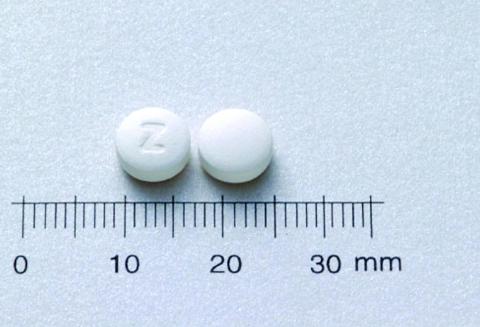The Food and Drug Administration (FDA) on Friday ordered the recall of 38 stomach medications after a popular heartburn medication was reportedly found to contain trace amounts of a chemical that can cause cancer.
The FDA announced the recall at 7pm after receiving an alert a week ago from regulators in the US and Europe that trace amounts of the carcinogen n-nitrosodimethylamine (NDMA) was found in Zantac, a popular heartburn medication produced by British pharmaceutical company GlaxoSmithKline.
The level of NDMA was very low, so the medication was not recalled from international markets, the FDA said in a statement.

Screen grab from the Food and Drug Administration’s Web site
On receiving the alert, the administration said it launched a comprehensive inspection of all medications in Taiwan that contain ranitidine, the main ingredient in Zantac.
Twenty-one drug companies held licenses to produce 38 stomach acid drugs containing ranitidine as the main ingredient, including Culcer’s 300mg film-coated daily tablet, it said.
The FDA said that it then ordered a precautionary recall of the 38 medications.
The pharmaceutical companies must complete their recalls by tomorrow, FDA official Wu Ming-mei (吳明美) said.
They will not be allowed to market the medications until after the drugs pass a test proving that the amount of NDMA in them is within a safe range, she said.
Manufacturers failing to remove their medications from stores would face a fine of NT$60,000 to NT$300,000, according to the Consumer Protection Act (消費者保護法), Wu added.
More than 80 million tablets of stomach acid drugs containing ranitidine are prescribed to National Health Insurance patients each year, the FDA said.

Taiwan is to commence mass production of the Tien Kung (天弓, “Sky Bow”) III, IV and V missiles by the second quarter of this year if the legislature approves the government’s NT$1.25 trillion (US$39.78 billion) special defense budget, an official said yesterday. Commenting on condition of anonymity, a defense official with knowledge of the matter said that the advanced systems are expected to provide crucial capabilities against ballistic and cruise missiles for the proposed “T-Dome,” an advanced, multi-layered air defense network. The Tien Kung III is an air defense missile with a maximum interception altitude of 35km. The Tien Kung IV and V

The disruption of 941 flights in and out of Taiwan due to China’s large-scale military exercises was no accident, but rather the result of a “quasi-blockade” used to simulate creating the air and sea routes needed for an amphibious landing, a military expert said. The disruptions occurred on Tuesday and lasted about 10 hours as China conducted live-fire drills in the Taiwan Strait. The Civil Aviation Administration (CAA) said the exercises affected 857 international flights and 84 domestic flights, affecting more than 100,000 travelers. Su Tzu-yun (蘇紫雲), a research fellow at the government-sponsored Institute for National Defense and Security Research, said the air

Taiwan lacks effective and cost-efficient armaments to intercept rockets, making the planned “T-Dome” interception system necessary, two experts said on Tuesday. The concerns were raised after China’s military fired two waves of rockets during live-fire drills around Taiwan on Tuesday, part of two-day exercises code-named “Justice Mission 2025.” The first wave involved 17 rockets launched at 9am from Pingtan in China’s Fujian Province, according to Lieutenant General Hsieh Jih-sheng (謝日升) of the Office of the Deputy Chief of the General Staff for Intelligence at the Ministry of National Defense. Those rockets landed 70 nautical miles (129.6km) northeast of Keelung without flying over Taiwan,

A strong continental cold air mass is to bring pollutants to Taiwan from tomorrow, the Ministry of Environment said today, as it issued an “orange” air quality alert for most of the country. All of Taiwan except for Hualien and Taitung counties is to be under an “orange” air quality alert tomorrow, indicating air quality that is unhealthy for sensitive groups. In China, areas from Shandong to Shanghai have been enveloped in haze since Saturday, the ministry said in a news release. Yesterday, hourly concentrations of PM2.5 in these areas ranged from 65 to 160 micrograms per cubic meter (mg/m³), and pollutants were